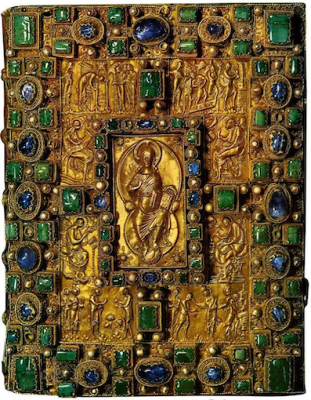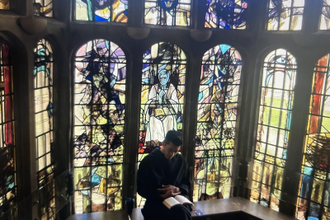Gospel in Art: You put aside the commandment of God to cling to human traditions

Codex Aureus of St Emmeram, produced for the Holy Roman Emperor Charles II (the Bald), 870 AD. Gold, inset with precious gemstones © Munich, Bayerische Staatsbibliothek.
Gospel of 7 February 2023
Mark 7:1-13
The Pharisees and some of the scribes who had come from Jerusalem gathered round Jesus, and they noticed that some of his disciples were eating with unclean hands, that is, without washing them. For the Pharisees, and the Jews in general, follow the tradition of the elders and never eat without washing their arms as far as the elbow; and on returning from the market place they never eat without first sprinkling themselves. There are also many other observances which have been handed down to them concerning the washing of cups and pots and bronze dishes. So these Pharisees and scribes asked him, 'Why do your disciples not respect the tradition of the elders but eat their food with unclean hands?' He answered, 'It was of you hypocrites that Isaiah so rightly prophesied in this passage of scripture:
This people honours me only with lip-service,
while their hearts are far from me.
The worship they offer me is worthless,
the doctrines they teach are only human regulations.
You put aside the commandment of God to cling to human traditions.' And he said to them, 'How ingeniously you get round the commandment of God in order to preserve your own tradition! For Moses said: Do your duty to your father and your mother, and, Anyone who curses father or mother must be put to death. But you say, "If a man says to his father or mother: Anything I have that I might have used to help you is Corban (that is, dedicated to God), then he is forbidden from that moment to do anything for his father or mother." In this way you make God's word null and void for the sake of your tradition which you have handed down. And you do many other things like this.'
Reflection on the Treasure Binding
In our Gospel reading of today, Jesus criticises the religious experts of the time (the Pharisees and some of the scribes) for giving more importance to their own religious tradition than to the Word of God. He says, 'You put aside the commandment of God to cling to human traditions'. He is saying that they are not getting their priorities right. We always need to allow our religious traditions that have grown over the centuries to be critiqued by the Word of God. The Word of God is at the very source of the church's tradition. The Word of God is the earliest and most privileged part of that tradition.
We are all invited to keep returning to the Word of God. In the Middle Ages, a unique art form developed to embellish the written word of God. This 'treasure binding' or jewelled bookbinding consisted of creating a highly luxurious book cover using precious metals such as gold or silver, set with jewels, ivory panels to make it more special than the standard materials for book-covers such as leather, velvet, or other cloth. A spectacular example of this craftsmanship is the Codex Aureus of St. Emmeram. It is a 9th century illuminated Gospel book. The cover of the codex is decorated with gems and relief figures in gold. Unusually, it can be precisely dated, to 870 AD, and is an important example of Carolingian Art. In later medieval times, the art form would develop into even more lavish examples. This example is one of very few early treasure bindings that have survived. It was produced for the Holy Roman Emperor Charles II (the Bald).
The cover is handmade of gold and inset with precious gemstones: sapphires, emeralds, and pearls. At the centre of the cover we see Christ in majesty depicted in repoussé relief (raised decoration achieved by hammering the reverse of the panel). He is seated on the globe of the world and holding on his knee a book inscribed with the words: "I am the way, and the truth, and the life. No man cometh to the Father, but by me." Christ is holding the Word of God.
LINKS
Gospel in Art: https://christian.art/
Today's reflection: https://christian.art/daily-gospel-reading/mark-7-1-13-2023/


















